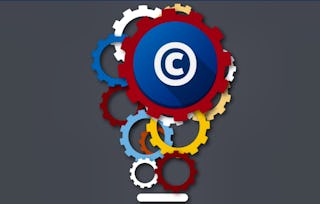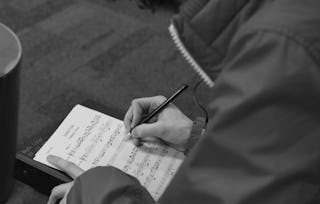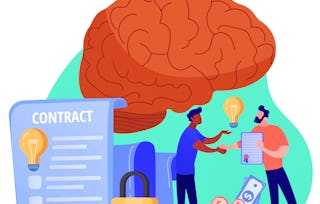Fear and uncertainty about copyright law often plagues educators and sometimes prevents creative teaching. This course is a professional development opportunity designed to provide a basic introduction to US copyright law and to empower teachers and librarians at all grade levels. Course participants will discover that the law is designed to help educators and librarians.


Copyright for Educators & Librarians


Copyright for Educators & Librarians



Instructors: Kevin Smith, M.L.S., J.D.
20,679 already enrolled
Included with
616 reviews
Skills you'll gain
Details to know

Add to your LinkedIn profile
11 assignments
See how employees at top companies are mastering in-demand skills

There are 5 modules in this course
Thank you for joining Copyright for Educators and Librarians! Our goal is to provide participants with a practical framework for analyzing copyright issues that they encounter in their professional work. We use a lot of real life examples—some of them quite complex and amusing—to help participants get used to the systematic analysis of copyright problems. This course is intentionally a first step toward bridging the gulf that is often perceived between desirable educational practice and legal permissible activities. We very much hope that this course will be a service to the library and education community, and that it provides a relatively fun and painless way to go deeper into copyright than the average presentation or short workshop allows. If you enjoy this course and would like to learn more about copyright in multimedia, that course will soon be available!
What's included
1 video4 readings
In the U.S., copyright is first and foremost a federal law passed by Congress under authority given it by the Constitution, where it says that Congress is allowed to pass laws to (among other things) promote the progress of science and the useful arts by securing for limited time to authors and inventors the exclusive right to their respective writing and discoveries. This authorization allows Congress to adopt both copyright laws which protect creative expression, and patent laws, which are very different and provide exclusive rights in inventions. In this unit we will examine what is copyright and how it happens.
What's included
9 videos3 readings3 assignments
For this module, we will discuss copyright ownership and what it means in an educational context. We will also discuss the public domain, the first sale doctrine, and the idea/expression dichotomy. This last concept—that creative expression can be copyrighted, but that the ideas behind it cannot—is one of Anne’s favorite topics in copyright law. As you’ll see in the video, the concept is applicable to many subjects and situations.
What's included
8 videos3 readings2 assignments
This module will cover specific exceptions in copyright law for libraries and educational instruction as outlined in Section 110(1) of the U.S. Copyright Law. The module will examine how this law applies to in-class and online instruction as well as library lending. Additionally, it will explore different licenses for those working in educational institutions and libraries, including the specifics of Creative Commons. Finally, we discuss identifying and requesting permissions for use of copyrighted material.
What's included
8 videos5 readings3 assignments
Fair Use is one of the most powerful aspects of U.S. copyright law for educators and librarians. In this module, we help students define Fair Use and understand where and in what contexts the law applies. We also address international aspects of copyright.
What's included
12 videos9 readings3 assignments
Instructors


Explore more from Education
 Status: Free Trial
Status: Free TrialUniversity of Pennsylvania
 Status: Preview
Status: PreviewDuke University
 Status: Free Trial
Status: Free Trial Status: Preview
Status: PreviewUniversity of Pennsylvania
Why people choose Coursera for their career

Felipe M.

Jennifer J.

Larry W.

Chaitanya A.
Learner reviews
- 5 stars
82.65%
- 4 stars
14.91%
- 3 stars
1.94%
- 2 stars
0.16%
- 1 star
0.32%
Showing 3 of 616
Reviewed on Nov 10, 2019
A very useful course for not just educators and librarians but also for creative & technical writers. Covers the legalities with real-time examples that make you think.
Reviewed on Aug 29, 2020
It is a very good introduction to copyright and fair use. I run a K-12 library and fair use issues come up often. The course has helped me better understand fair use and how to apply it.
Reviewed on Aug 8, 2020
This was eye opening and a very informative course for things to mind in terms of copyrighted materials and teaching! I loved the course! Thanks so much to the facilitators! AWESOME Indeed!

Open new doors with Coursera Plus
Unlimited access to 10,000+ world-class courses, hands-on projects, and job-ready certificate programs - all included in your subscription
Advance your career with an online degree
Earn a degree from world-class universities - 100% online
Join over 3,400 global companies that choose Coursera for Business
Upskill your employees to excel in the digital economy
Frequently asked questions
No. Completion of a Coursera course does not earn you academic credit from Duke; therefore, Duke is not able to provide you with a university transcript. However, your electronic Certificate will be added to your Accomplishments page - from there, you can print your Certificate or add it to your LinkedIn profile.
To access the course materials, assignments and to earn a Certificate, you will need to purchase the Certificate experience when you enroll in a course. You can try a Free Trial instead, or apply for Financial Aid. The course may offer 'Full Course, No Certificate' instead. This option lets you see all course materials, submit required assessments, and get a final grade. This also means that you will not be able to purchase a Certificate experience.
When you purchase a Certificate you get access to all course materials, including graded assignments. Upon completing the course, your electronic Certificate will be added to your Accomplishments page - from there, you can print your Certificate or add it to your LinkedIn profile.
More questions
Financial aid available,





